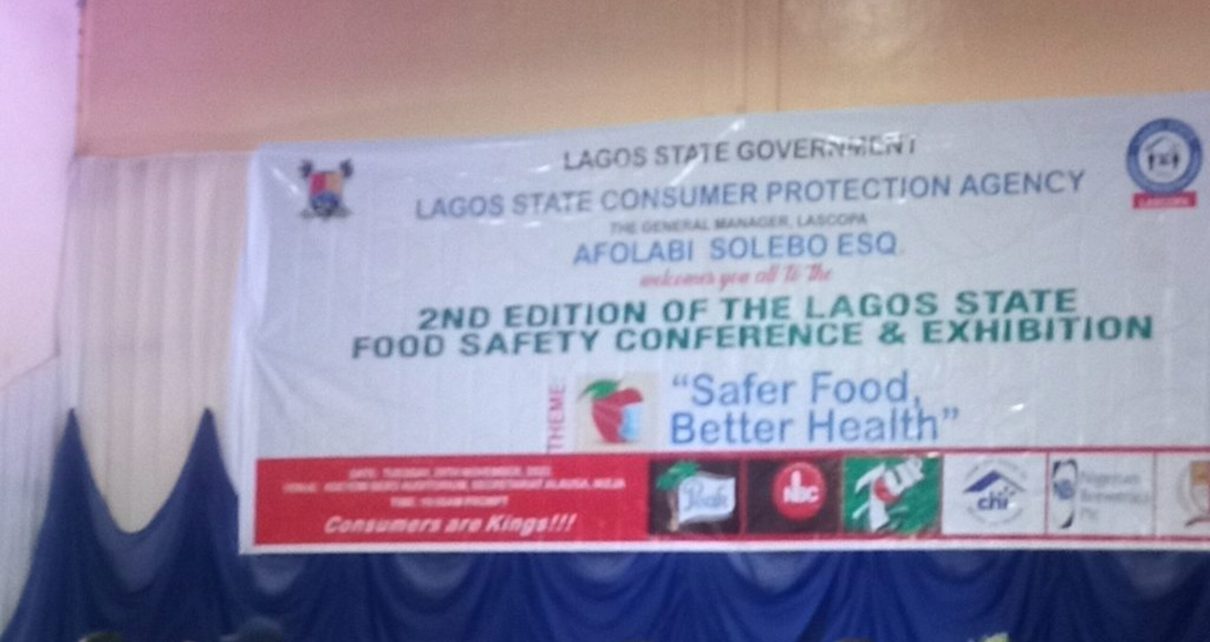The Lagos State Government has reaffirmed its dedication to improving the state’s food safety and decreasing food contamination.
This was announced by Dr. Lola Akande, the Lagos State Commissioner for Commerce, Industry, and Cooperative, on Tuesday during the second annual Lagos State Food Safety Conference & Exhibition in Alausa, Lagos.
The Lagos State Consumer Protection Agency (LASCOPA) organised the conference with the topic “Safer Food, Better Health.”
Akande made the observation that hazardous food constituted a threat to human health that affected vulnerable people, notably women and children, in her capacity as the ministry’s Permanent Secretary, Mrs. Adetutu Ososanya.
The commissioner advised people not to buy meals from roadside vendors since they can be dangerous if they aren’t properly prepared in a clean atmosphere.
“There are many risks associated with street food which can have unhygienic vending practices, inappropriate storage of food, and also the use of contaminated water.
“Poor environmental sanitation, inappropriate waste disposal system and lack of potable water are some of the factors militating against food safety.
“When people stop patronising roadside food vendors, it will save them a whole lot of money spent on treating unnecessary ailments,” she said.
The commissioner said that producers and manufacturers in the state had no tolerance for violating consumer rights or engaging in any other unfair business practices.
Akande pointed out that there is legislation that allows for the prosecution of producers, businesses, and dealers that intentionally violate customers’ rights by selling unhealthy goods.
According to her, LASCOPA was created to answer public complaints about everything from expired items to unfair business activities typically carried out by companies that produce and promote goods and services.
The commissioner advised customers to use the agency’s existence to file any complaints they may have over the violation of their rights, adding that the agency’s services were free.
The LASCOPA General Manager, Mr. Afolabi Solebo, noted in his welcoming speech that food safety was essential because of the potential health implications that eating unhealthily and unwholesomely could have on a person’s body.
The general manager warned that this could result in fatalities and, in other cases, life-threatening illnesses.
He said: “It behoves concerned stakeholders to reiterate that food safety is one of the most critical guarantors for good health as unsafe foods contribute to poor conditions.
“This can lead to impaired growth and development, micronutrient deficiencies, non-communicable or communicable diseases and mental illness.
“The fact that one in ten people globally is affected by foodborne diseases annually makes it indispensable to transform food systems to deliver better health in a sustainable manner to prevent most foodborne diseases.
“To this end, food vendors must comply with international food standards and engage employees, suppliers, and other stakeholders to grow and develop a food safety culture.”
Solebo pointed out that the organisation had continuously urged customers to openly seek redress and receive compensation if necessary.
In keeping with the THEME goal of the state government, he believed that this second edition would generate the necessary elements to build on its achievements and efforts in promoting improved health through the consumption of safe foods in the state.
Federal University of Agriculture, Abeokuta (FUNAAB) Food Technology Professor Prof. Folake Henshaw encouraged state governments to control the sale of street food in the nation.
Henshaw, who is also the GHI’s Country Ambassador, noted that the main sources of food poisoning both domestically and internationally were street food vendors.
She stated that each year, no less than 600 million individuals experience food poisoning worldwide and that 2.4 million cases were documented in Nigeria.
Henshaw regretted that there was a significant underreporting of such occurrences, particularly in rural areas, which is why the various levels of government needed to set up the machinery to control the industry.
The don countered that since the industry helps to reduce poverty in the nation, it could not be fully outlawed.
Henshaw claims that the nation’s consumption of street food has increased as a result of the nation’s rising urbanisation and that it offers ready-to-eat food on the go.



